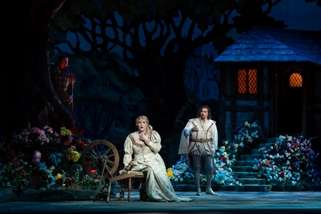|
Back
Stellar Playing But Less-Than-Stellar Singing in DC Washington
The Kennedy Center
03/16/2019 - & March 18, 22, 24, 27, 30, 2019
Charles Gounod: Faust
Erin Wall (Marguerite), Marcelo Puente (Faust), Joshua Hopkins (Valentin), Raymond Aceto (Méphistophélès), Deborah Nansteel (Dame Marthe), Allegra De Vita (Siébel), Samson McCrady (Wagner)
Washington National Opera Chorus, Steven Gathman (Chorus Master), Washington National Opera Orchestra, Keri-Lynn Wilson (Conductor)
Garnett Bruce (Director), Michael Clark (Lighting Designer), Earl Staley (Set and Costume Designer), Joe Isenberg (Fight Coordinator)

R. Aceto, M. Puente, E. Wall (© Scott Suchman)
In the last 150 years, has any opera suffered quite as extreme a decline in popularity (in America, at least) as Faust? It seems hard to believe that this was the first work presented by the Met when it opened in 1883, or that, as I recall, it was that company’s most frequently performed work in its first several decades. If not quite a rarity today, it is far from ubiquitous; and in a somewhat belated changing of the guard, the masterpiece of Gounod’s erstwhile student Georges Bizet—Carmen—has firmly supplanted Faust as the world’s French opera of choice, and vies for the title of World’s Favorite Opera with the likes of La Bohème and . At one level this is understandable: Bizet’s score outdoes Gounod’s for exotic allure, and I suppose the former’s tale of a femme fatale resonates better with modern audiences than the theme of a deal with the devil and its consequences.
Yet it would be foolish to dismiss what remains Gounod’s most well-known opera on the above grounds, or nearly any grounds for that matter. There is less shock value here than in Carmen, to be sure, but Gounod has a fine dramatic sensibility. Furthermore, the freshness and charm of his melodic inspiration arguably matches—if not exceeds—that of Verdi in all but the latter’s greatest moments, and Gounod far surpasses Verdi (except perhaps in his late Shakespearean operas) in his almost Wagnerian treatment of the orchestra as an integral part of the drama rather than as mere accompaniment. On all these counts, I would take Faust over Traviata any day.
The Washington National Opera’s new production of Faust is a boon to anyone who delights in Gounod’s writing for the orchestra. The WNO’s pit ensemble has received its share of criticism, but with the exception of a single sloppy run in the strings in Act III, the execution was satisfyingly crisp throughout. Conductor Keri-Lynn Wilson was new to me, but she gave a nearly symphonic reading of the orchestral score, balancing sweep and attention to detail. It is rare in opera to hear a conductor lavish the same attention upon instrumental phrasing as one hears from a fine singer; Wilson does so, and extremely convincingly at that—for the most part. One has to wonder whether the unusually robust and grand sound emanating from the pit served to inhibit the singers, who all struggled at times to project over the orchestra. Indeed, the singing proved something of a disappointment, on opening night at least. There was no really open, ringing voice to be heard, and all the principals were afflicted with varying degrees of intrusive wobble. This was a shame, for the somewhat gargly-voiced Raymond Aceto (Méphistophélès) is clearly a fine vocal actor, with real stage presence, and Marcelo Puente (Faust) suggested a basically quite appealing tone underneath his quite rapid vibrato; at times I wondered if Puente was straining a little too hard. Erin Wall’s Marguerite was not resplendent, but on the whole she surpassed Aceto and Puente for security and natural musicality and proved a high point of the show vocally, alongside Allegra De Vita (Siébel) among the supporting roles. Even the choir took some time to warm up, with a rather rocky start at the beginning of Act II. (Incidentally, Earl Staley’s set is satisfyingly traditional and extremely colorful—what a garden in Act III!—although I could have done without the semi-transparent “curtain” behind which the action in Act I transpired.)
Keri-Lynn Wilson has, it seems, spent the bulk of her career as an opera conductor, and so it was surprising that she apparently did so little to accommodate her singers; here the orchestra certainly took the spotlight. Perhaps everyone on stage was simply having an off-day. Those who attend the opera just to hear the singers should consider themselves forewarned, but for my part I found the conducting thrilling, as far as the orchestral part went. If only the voices had the sheer weight to match the conductor’s vision!
Samuel Wigutow
|